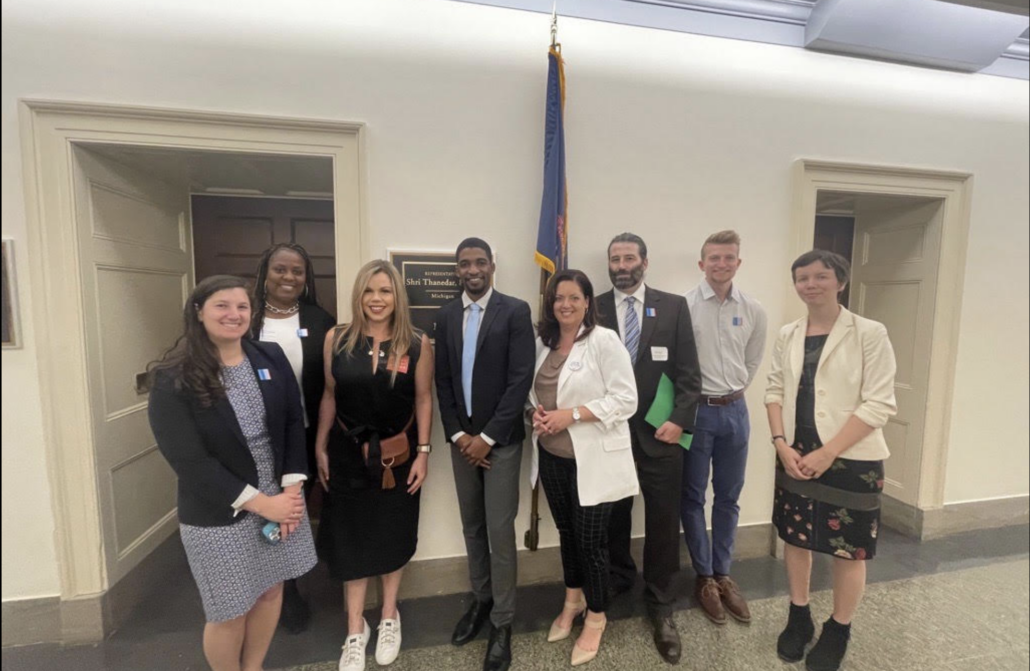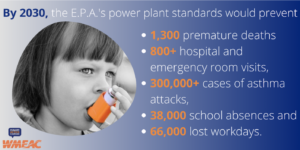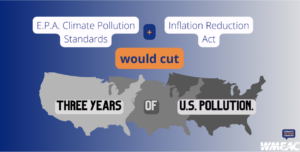By Kelly Otterness
As soon as West Michigan’s air quality improved on July 3rd, my partner and I were out the door, spontaneously packing for our first camping trip along Lake Michigan. We woke on the 4th of July to the sounds of waves crashing and ran straight into the icy water. I gasped a refreshing gulp of air—it was probably the first deep breath I’d taken in a week.
Despite my attempts to lock it out, the Canadian wildfire smoke had slowly invaded our home. By the end of the week, I’d felt suffocated and trapped inside.
I knew I wasn’t alone in struggling with the smoke, though.
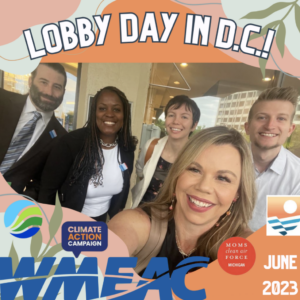
A few days after the smoke first reached Grand Rapids, WMEAC traveled to Washington D.C. to ask Michigan’s senators and representatives to defend climate progress. We asked them to sign a “Dear Colleague” letter encouraging other legislators to urge the E.P.A. to pass the strongest climate pollution standards possible for fossil fuel-fired power plants.
We also asked our members of Congress to protect climate-smart agriculture funding in the 2023 Farm Bill and to defend the funds for a clean energy transition in President Biden’s history-making Inflation Reduction Act of 2022.
WMEAC joined a dozen state environmental groups in a coalition called the Climate Action Campaign.
I was heartened by meeting Michigan’s group of environmental organizers. We formed a scrappy and fun team with an unstoppable outlook. Better yet, our senators and representatives said they were ready to act on climate pollution, especially after hearing what was going on back home.
In one weekend, the smoke in Michigan had already caused health impacts for our team. WMEAC’s Executive Director, Bill Wood, shared how sick he’d felt from the smoky air in Michigan the weekend before our trip, even as a healthy adult. Elizabeth Hauptman of Moms Clean Air Force Michigan opened up about how the smoke triggered a severe asthma attack for her young son. She started to well-up as she remembered worrying that his nebulizer wouldn’t be enough, and they’d need to rush him to an Emergency Room. To give more context, WMEAC’s Director for Climate Solutions and Justice, Deirdre Nieves, shared her intimate knowledge of the widespread health impacts from pollution that Michigan’s most vulnerable communities endure, including high rates of asthma.
The simple actions we asked our legislators to take could stop over 16.5 billion tons of carbon pollution from entering our air. By 2030, that would prevent over 300,000 asthma attacks.
WMEAC made our voices heard through public comments and testimonies as well. While in D.C., Deirdre Nieves testified to the E.P.A. over Zoom. She urged the E.P.A. to protect the communities most vulnerable to climate pollution when setting these coal and gas power plant standards. Hispanic and Latin American and Native Americans are 43% and 37% more likely to live in places where climate change threatens labor opportunities, potentially endangering livelihoods. Black children are 34% more likely to experience asthma exacerbated by climate change, and African Americans are 40% more likely to die from rising temperatures (E.P.A. peer-reviewed study, 2021). The E.P.A.’s rules need to be especially mindful of the people who predominantly suffer from power plants’ pollution.
Why I submitted an E.P.A. public comment
I left my hometown of New York City in January, looking for a long-term safe haven from climate change pollution’s effects: the smoggy air, the rising sea levels, and the memory of Hurricane Sandy’s devastations. One night after the hurricane’s floods I ventured back to Manhattan over the Brooklyn Bridge. The Brooklyn half of the bridge was illuminated, but as I reached the midpoint I saw the other half’s lights out, and beyond it saw all of lower Manhattan engulfed in darkness. Those were hard days. In the isolating dark, my neighbors struggled with their mental health and the physical damages of flooding. Those nights sparked my passion for fighting climate change.
Michigan promises a more stable long-term future for people like me who’ve come here to join loved ones in delighting in nature and breathing the famous #PureMichigan air. Now that I’ve experienced the incredible healing power of the Great Lakes and the warmth of West Michiganders, I feel even more dedicated to preserving the health of this state’s air and water. For me, WMEAC and the Climate Action Campaign’s missions feel more urgent than ever.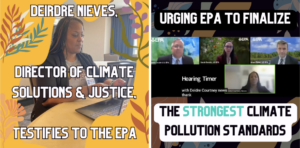
What are the Climate Action Campaign’s goals, anyway?
CAC’s first campaign, Solutions for Pollution, advances 20 key climate and public health protections across federal agencies. Right now we are collecting this national wave of public comments to strengthen the Environmental Protection Agency’s climate pollution standards.
Climate Wins Here, CAC’s second campaign, educates the public and key stakeholders on the many local benefits of climate investments in the Inflation Reduction Act and the Bipartisan Infrastructure Law. Getting face-to-face with our D.C. legislators was part of this work!
Celebrating an Independence Day from Climate Pollution!
These past few weeks, it’s been a relief to deeply breathe clean air again, to bike and run outside—or simply leave the house—without health anxiety.
With the help of the E.P.A.’s standards and Biden’s Inflation Reduction Act, we can get on track to finally celebrate a national Independence Day from climate pollution.
We just hit the one year anniversary of the Inflation Reduction Act—President Biden’s “historic down payment” on the clean-energy transition. Maybe August 16th marked our new green Independence Day!
West Michiganders know the best way to celebrate: a dive into Lake Michigan and a deep breath of fresh air.
